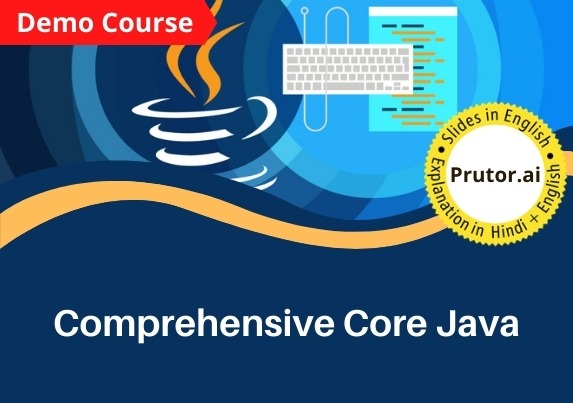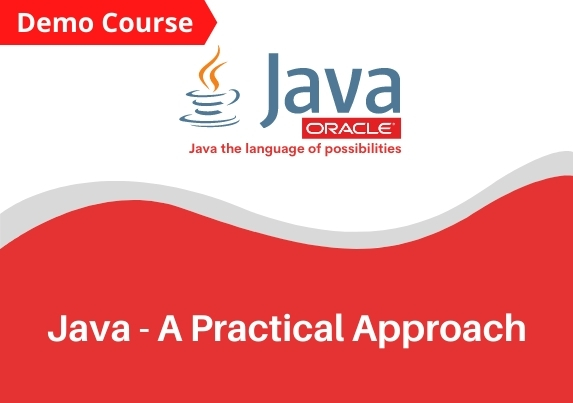About the Course
इस कोर्स में, आप Core Java के fundamental concepts को सीखेंगे, जिसमें operators, functions और loops आदि के साथ काम करना शामिल है। Object-oriented programming जैसे advanced concepts भी इस कोर्स में शामिल हैं, जिसमें classes और objects के साथ काम करना, Inheritance और encapsulation, polymorphism और abstraction आदि का उपयोग करना शामिल है। यह कोर्स मुख्य रूप से एक practical approach पर केंद्रित है और आपसे कई बार code टाइप करके practice करने की अपेक्षा करता है ताकि आप इसमें पूरी तरह से proficient हो सकें।
Learning Outcome
इस कोर्स को पूरा करने के बाद, आप -
- Programming के मूल सिद्धांतों को समझ पाएंगे जैसे कि variables, conditional और iterative execution, methods आदि
Java में object-oriented programming के fundamentals को समझ सकेंगे, जिसमें classes को परिभाषित करना, invoke करने के methods, class libraries का उपयोग करना आदि शामिल है - ऐसे Java programs को write, compile और execute कर पाएंगे, जिसमें basic data types और control flow constructs शामिल हो सकते हैं। इसमें Integrated Development Environment (IDE) का उपयोग किया जाता है जिसे Eclipse के रूप में जाना जाता है।
- Inheritance, test classes और exception handling सहित parameters, constructors, utility और calculations methods के साथ object-oriented class structures का उपयोग करके Java programs को write, compile और execute कर सकेंगे।
- Innovative और independent learning के माध्यम से अपनी hireability को बढ़ा पाएंगे
- कोर्स के सफलतापूर्वक पूरा होने पर certificate प्राप्त कर सकेंगे
Target Audience
The course can be taken by:
Students: All students who are pursuing professional graduate/post-graduate courses related to computer science or Information Technology.
Teachers/Faculties: All computer science and engineering teachers/faculties.
Professionals: All IT professionals.
Why learn Core Java
Java एक open-source, platform-independent भाषा है। बाद के वर्षों में, भाषा Windows, Macintosh और UNIX-based desktops, Android-based mobiles, embedded systems और enterprise solutions सहित कई platforms पर लाखों applications का आधार बन गयी है। Oracle (जिसने 2010 में Sun Microsystems का अधिग्रहण किया) के अनुसार, Java अब 3 बिलियन से अधिक उपकरणों में प्रयोग कि जाती है। Java को न केवल Java programmers बनने के लिए सीखना अच्छा है, बल्कि Android या Hadoop में प्रशिक्षित होकर अपने करियर में अगले स्तर पर जाने के लिए भी अच्छा है।
Android कैरियर के सबसे अच्छे विकल्पों में से एक के रूप में उभरा है। Android पर applications और games विकसित करने के लिए Android developers को Java को जानना आवश्यक है। इसी तरह, Java Big Data और Hadoop सीखने का आधार है। यदि आप केवल Java से अच्छी तरह परिचित हैं तो आप Hadoop और इसके fundamentals में महारत हासिल कर सकते हैं। Java जैसी प्रोग्रामिंग भाषाओं के ज्ञान के साथ संभावनाएं आपके लिए उज्ज्वल हैं। निकट भविष्य में, Java programmers के लिए बहुत सारे अवसर हैं। 2014-2024 की अवधि के लिए 19 प्रतिशत की अनुमानित विकास दर के साथ (U.S. Bureau of Labor Statistics के अनुसार सभी application programming), Java programmers के लिए career की संभावनाएं वास्तव में अच्छी हैं।
Test & Evaluation
1. During the program, the participants will have to take all the assignments given to them for better learning.
2. At the end of the program, a final assessment will be conducted.
Certification
1. All successful participants will be provided with a certificate of completion.
2. Students who do not complete the course / leave it midway will not be awarded any certificate.
Topics to be covered
- Comp.CoreJava - Day01
This is only a demo course. The full course can be bought here
- Encapsulation
- Inheritance, Is-A, Has-A
- Polymorphism
- JDK, JRE, JVM
- Declare Classes
- Source File Declaration Rules
- Class Declarations and Modifiers
- Concrete Subclass
- Declare Class Members
- Access Modifiers
- Nonaccess Member Modifiers
- Constructor Declarations
- Variable Declarations
- Declaring an Interface
- Declaring Interface Constants
- Overridden Methods
- Overloaded Methods
- Reference Variable Casting
- Implementing an Interface
- Overloaded Constructors
- Statics
- Static Variables and Methods
- Coupling and Cohesion
- Assignment Operators
- Casting Primitives
- Using a Variable or Array Element That Is Uninitialized and Unassigned
- Local (Stack, Automatic) Primitives and Objects
- Passing Variables into Methods
- Passing Object Reference Variables
- Does Java Use Pass-By-Value Semantics?
- Passing Primitive Variables
- Array Declaration, Construction, and Initialization
- Declaring an Array
- Constructing an Array
- Initializing an Array
- Handling Exceptions
- Catching an Exception Using try and catch
- Using finally
- Propagating Uncaught Exceptions
- Defining Exceptions
- Exception Hierarchy
- Handling an Entire Class Hierarchy of Exceptions
- Exception Matching
- Exception Declaration and the Public Interface
- Rethrowing the Same Exception
- Common Exceptions and Errors
- Defining, Instantiating, and Starting Threads
- Defining a Thread
- Instantiating a Thread
- Starting a Thread
- The Thread States and Transitions
- Thread States
- Preventing Thread Execution
- Sleeping
- Thread Priorities and yield( )
- Synchronizing Code
- Synchronization and Locks
- Thread Deadlock
- Thread Interaction
- Using notifyAll( ) When Many Threads May Be Waiting
- Introduction to File class
- ByteSteam and Character Stream
- Serialization with Java IO
- Overriding hashCode() and equals()
- Overriding equals()
- Overriding hashCode()
- Collections
- So What Do You Do with a Collection?
- List Interface
- Set Interface
- Map Interface
- Queue Interface
- Using the Collections Framework
- ArrayList Basics
- Autoboxing with Collections
- Sorting Collections and Arrays
- Navigating (Searching) TreeSets and TreeMaps
- Other Navigation Methods
- Polymorphism and Generics
- Introduction to JDBC
- Architecture of JDBC
- Role of Driver Manager
- Understanding JDBC Driver Types







